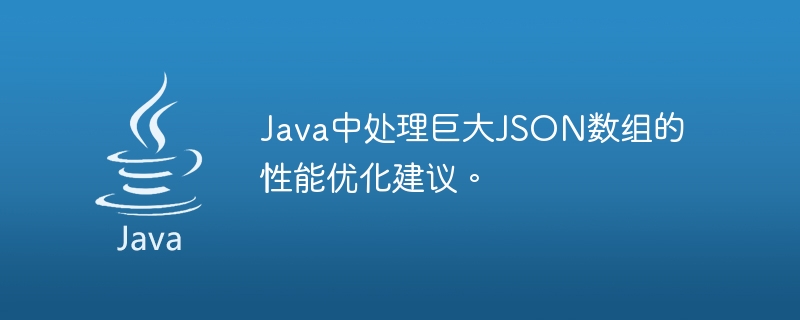Home >Java >javaTutorial >Performance optimization suggestions for handling huge JSON arrays in Java.
Performance optimization suggestions for handling huge JSON arrays in Java.
- 王林Original
- 2023-09-06 15:33:151853browse

Performance optimization suggestions for processing huge JSON arrays in Java
Abstract: With the rapid development of the Internet and big data, we often need to process large JSON arrays. This article will introduce some performance optimization suggestions for processing huge JSON arrays in Java and provide corresponding code examples.
Introduction:
In modern software development, JSON (JavaScript Object Notation) has become a widely used data exchange format. However, performance issues often become a challenge when dealing with huge JSON arrays. Here are some suggestions to improve performance when processing JSON arrays.
- Use a suitable JSON library
There are many excellent JSON libraries to choose from in Java, such as Jackson, Gson and JSON-java. When dealing with huge JSON arrays, it is very important to choose a high-performance JSON library. These libraries usually have some high-level API for processing large amounts of JSON data. For example, in the Jackson library, we can use the Streaming API to process huge JSON data.
Sample code:
import com.fasterxml.jackson.core.JsonFactory;
import com.fasterxml.jackson.core.JsonParser;
import com.fasterxml.jackson.core.JsonToken;
public class JsonArrayProcessor {
public static void main(String[] args) throws Exception {
JsonFactory jsonFactory = new JsonFactory();
JsonParser jsonParser = jsonFactory.createParser(new File("huge.json"));
while (jsonParser.nextToken() != JsonToken.END_ARRAY) {
// 处理每个JSON对象
}
jsonParser.close();
}
}- Using streaming
Using streaming can reduce memory consumption and improve performance. Streaming processes only a portion of the data at a time without loading the entire JSON array into memory.
Sample code:
JsonReader jsonReader = new JsonReader(new FileReader("huge.json"));
jsonReader.beginArray();
while (jsonReader.hasNext()) {
// 处理每个JSON对象
}
jsonReader.endArray();
jsonReader.close();- Use appropriate data structure
Choose an appropriate data structure to store and process JSON data based on specific needs. For example, if you need to query and modify JSON data frequently, you can use Map to store the properties of JSON objects. If you need to access JSON data sequentially, you can use List to store JSON objects.
Sample code:
List<Map<String, Object>> jsonArray = ...;
for (Map<String, Object> jsonObject : jsonArray) {
// 处理每个JSON对象
}- Use multi-threading processing
For huge JSON arrays, you can use multi-threading to process data in parallel to increase processing speed. JSON arrays can be split into multiple parts and assigned to different threads for processing.
Sample code:
ExecutorService executorService = Executors.newFixedThreadPool(Runtime.getRuntime().availableProcessors());
List<Future<?>> futures = new ArrayList<>();
for (int i = 0; i < jsonArray.size(); i++) {
final int index = i;
futures.add(executorService.submit(() -> {
// 处理某个部分的JSON对象
}));
}
// 等待所有线程完成
for (Future<?> future : futures) {
future.get();
}
executorService.shutdown();Conclusion:
When dealing with huge JSON arrays, choose the appropriate JSON library, use streaming, use appropriate data structures, and use multiple Thread processing can improve performance and reduce memory consumption. Depending on the specific needs and scenarios of the application, combined with the above suggestions, we can process large JSON arrays more efficiently.
References:
- Jackson Documentation - https://github.com/FasterXML/jackson-docs
- Gson User Guide - https://github. com/google/gson
- JSON-java (org.json) Documentation - https://github.com/stleary/JSON-java
The above is about processing huge amounts in Java Performance optimization suggestions for JSON arrays and corresponding code examples. Hope it helps readers!
The above is the detailed content of Performance optimization suggestions for handling huge JSON arrays in Java.. For more information, please follow other related articles on the PHP Chinese website!
Related articles
See more- How does Java's classloading mechanism work, including different classloaders and their delegation models?
- How do I create and use custom Java libraries (JAR files) with proper versioning and dependency management?
- How can I use JPA (Java Persistence API) for object-relational mapping with advanced features like caching and lazy loading?
- How do I implement multi-level caching in Java applications using libraries like Caffeine or Guava Cache?
- How do I use Maven or Gradle for advanced Java project management, build automation, and dependency resolution?

